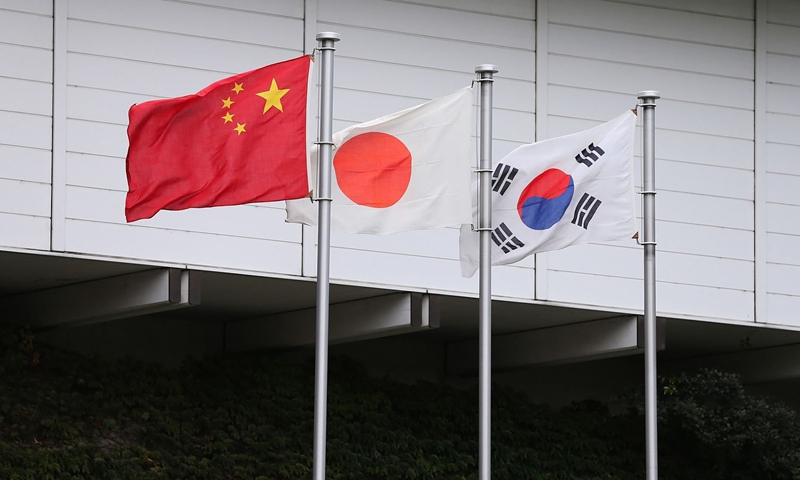
China Japan South Korea File photo:CGTN
Amid growing global challenges, the upcoming trilateral summit between China, Japan, and South Korea holds great importance for bolstering trilateral economic cooperation, Park Seung Chan, chairman of The Federation of Korea-China said in an exclusive interview with the Global Times, highlighting the top-level meeting as a chance to pave the way for more business potential and economic engagements.
The remarks came ahead of the long-awaited 9th China-Japan-ROK Trilateral Summit Meeting, which is scheduled to be held in Seoul on May 26-27 and aims to revive regional cooperation, marking the first trilateral talks between the three neighbors in more than four years.
The chairman noted that the meeting has not only captured substantial international attention but, more importantly, is also eagerly awaited by industry players and people from all three sides. China, Japan, and South Korea are mutually dependent due to their geographical proximity and closely intertwined economic ties, Park said.
Facing policy pressures from the West, the past few years have witnessed disruptions and setbacks in industrial and supply chain cooperation among our three countries, Park said. However, he underscored the resolute desire within the South Korean business community to explore more trade and business potential.
"I believe businesses from all three sides are eager to facilitate industrial chain cooperation, boost economic and trade ties, and bolster investment and partnership, in a bid to foster a paradigm of mutually beneficial development," Park said.
Park viewed the resumption of the high-level meeting as "an encouraging sign" and "the most recent breakthrough" for trilateral ties, despite lingering external pressures and risks. He also expressed hope that through this summit, the three neighboring countries can reconstruct avenues for people-to-people exchanges and establish platforms for cooperative dialogue across various sectors.
When speaking of the specific areas for potential cooperation, the chairman listed an array of emerging industries such as culture, tourism, green energy, environmental protection, and agriculture. The three countries each possess unique strengths in the high-tech sector, and by forming win-win cooperation, we may jointly tap the vast global markets, Park said.
The chairman encouraged the three sides to seek innovative methods and models of cooperation, and continuously explore new areas of collaboration, starting with easier initiatives such as personnel exchanges and cultural interactions. "Through innovative approaches, we can seek more economic and social complementarity, thereby creating more opportunities for cooperation," he added.
China, as the world's largest single market, is of immense significance to South Korean enterprises, which have shown a strong willingness to tap the promising market, Park said, highlighting the potential of industrial integration for the region.
Looking forward, the chairman said that a bright regional future hinges on all sides striving to achieve greater consensus through dialogue, eliminating policy barriers and obstacles, and addressing corporate concerns to promote the expansion of investment cooperation, especially amid escalating global uncertainty and external interferences.
China, Japan, and South Korea, as neighboring countries and major economies in Asia and the world, initiated trilateral cooperation during the process of jointly addressing the Asian financial crisis, China's foreign ministry spokesperson Wang Wenbin said at a regular press conference on Thursday.
Over the past 25 years since the launch of the China-Japan-ROK cooperation, a cooperative framework centered around the summit meeting and supported by ministerial meetings, senior officials' meetings, and over 70 working-level mechanisms has gradually been established, Wang said.




